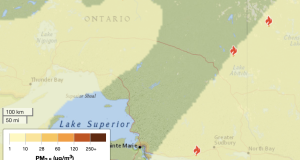Well, here we are in 2022. At this point last year, many of us were really hoping that by this time, we’d be leaps and bounds ahead of where we are today. We are still struggling with a pandemic that has affected just about every aspect of our lives. And you know what, that’s a good thing that we did have that hope. Hope is one of the primary nutrients we need to continue living and facing life’s challenges. Noble Prize-winning physicist Albert Einstein’s genius was not limited to just science. In many ways, he was a brilliant philosopher too. Einstein once said, “Learn from yesterday, live for today, hope for tomorrow. The important thing is not to stop questioning.”
The people of Ontario are not just sitting back and taking it on the chin from COVID-19s Delta and Omicron variants. We are fighting back in every way we can. Not only are we determined to make it through this epidemic, but we are also taking advantage of this catastrophe to examine some of our failing policies, practices and systems. We are determined to pinpoint weaknesses so that we can make improvements that will make life better for everyone in days to come.
Given that we are experiencing a public health and medical crisis, it is natural that we focus heavily on our healthcare system. However, some of the weaknesses may have until now barely shown up on the radar at the provincial scale. But now, they are presenting as glaring problems that we should have addressed long ago but failed to do so. Therefore, we must seize this opportunity to address these issues while they are exposed and readily studied.
One of the mainstays of Canadian healthcare is that all people should have access to universal, free healthcare no matter where they live. Yet, for decades, Northern Ontarians have maintained that we do not have access to medical services that are equitable with those available in other regions of the province.
I recently came across an outstanding article by Dr. Sarah Newbery in the January 6th, 2022 edition of Healthydebate.ca. Newbery is a family physician who has served communities in the Marathon area for twenty-five years. The circumstances she describes will resonate with many northerners. Dr. Newbery writes:
“In our community of Marathon, there is funding for six rural general family physicians and we have a small Family Health Team. We have no specialists. Our nearest larger centres are 300 kilometres away to the west (Thunder Bay) and 400 kilometres away to the east (Sault Ste. Marie). Many of our patients cannot easily travel because of poverty, lack of vehicle access, illness, age and the challenges of a twisty, craggy highway that’s a menace in the winter.”
Dr. Newbery explains that their health team consults with specialists on the phone and follow up their recommendations with patients locally as best they can. However, “this work – the kind of comprehensive community-responsive care that has supported the health of rural systems in northern Ontario for years – is in jeopardy. Today in Northern Ontario, according to community-level recruiter information, we need more than 300 physicians. Of those, we need 97 rural generalist family physicians in our small communities. There is an increase in need by 10 physicians since December 2020, mirroring a trend for family physicians across the North.”
The described realities are the same all across the North.
Here in Algoma-Manitoulin, my team and I have been working diligently on a string of such issues stretching from Manitouwadge, along the North Shore and over to Manitoulin Island. Right now, there is a severe shortage in the Thessalon–Bruce Mines community, where they narrowly averted having to close the hospital over the Christmas break. Some communities and doctors have been working for several years now, trying to recruit new doctors to replace those who have been wanting to retire for some time. Across the region, I hear from health team managers with numerous doctors who are approaching an age when they want to slow down progressively. Doctors hope to pass off their caseloads and share their skills, knowledge and experience with younger physicians looking to set up practice and establish roots.
According to the Ontario Medical Association (OMA), “Northern Ontario makes up almost 90 percent of Ontario’s landmass but contains only six percent of its population. The OMA has long recognized that Northern Ontarians do not have equitable access to the care they need and deserve within their own communities. But let’s be clear on what equitable access to care means. It means that Northern Ontarians should have the right to access the same care and medical services that every patient in this province has. To read the article, search online Perscription for Ontario: Doctors’ 5-Point Plan for Better Health Care.
The OMA states that the doctor and healthcare professional shortage in Northern Ontario is very real. Added to these shortages are serious challenges such as proximity to service availability, deteriorating or lack of necessary infrastructure, travel costs and weather conditions. In total, these realities combined lead Northern Ontarians down a path to social, cultural, economic and health crises.
The OMA is proposing five priorities to focus upon to improve healthcare across Ontario:
- Reduce wait times and the backlog of services
- Expand mental health and addiction services in the community
- Improve home care and other community care
- Strengthen public health and pandemic preparedness
- Give every patient a team of healthcare providers and link them digitally
Ontario’s health care services are now stretched beyond their limits. Caregivers and health professionals are working harder than ever. Yet after the drastic cuts of the Conservative years and 15 years of neglect, frozen budgets and cuts under the Liberals, health care in Ontario is falling short of what families need. Waits are long. There’s a hallway medicine crisis.
Andrea Horwath and the NDP believe that delivering quality public health care is the most important thing our government does. It’s time to start moving forward again, so Ontarians can expect more from the health services we’ve built together.
We don’t have to settle for that anymore. The time has come for Ontario to tackle these issues once and for all.
I wholeheartedly agree with Dr. Newbery’s conclusion to her article when she states, “We have the solutions in Ontario. We need the will.”
As always, please feel free to contact my office about these issues or any other provincial matters. You can reach my constituency office by email at [email protected] or phone at 705-461-9710 or Toll-free at 1-800-831-1899.
- MPP Mantha seeks update on Northern Health Travel Grant - November 27, 2024
- Fixing the housing crisis is not easy work, but it’sa job we can’t afford to put off any longer - June 17, 2024
- Résoudre la crise du logement n’est pas un travailfacile, mais c’est un travail que nous ne pouvonspas nous permettre de reporter plus longtemps - June 17, 2024
 Wawa-news.com You can't hear the 'big picture'!
Wawa-news.com You can't hear the 'big picture'!


